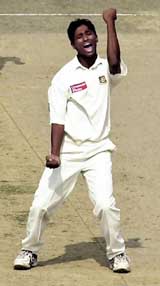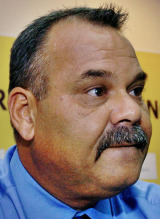Facing the future with new confidence
Some things have definitely changed since Bangladesh's unforgettable day at Cardiff on June 18
Rabeed Imam
19-Jul-2005
|
|

|
Some things have definitely changed since Bangladesh's unforgettable day at Cardiff on June 18. The relentless argument against their Test status has lost some steam. There has been a marked improvement in the body language of the players, and the belief that fluctuates like the frequent power disruptions in this part of the world has never been more pronounced. If Australia can be pushed to the limit and even toppled, and if Harmison and Co. can be dispatched into the clouds on certain days, then where's the harm in expecting even more heroics against lesser opposition?
Well that seems to be the way the fans and a section of Bangladesh's media are thinking, ahead of the Tigers' next assignment, the September tour of Sri Lanka. And for once, there are several factors in their favour - a young side bristling with confidence and devoid of fear, conditions that would give them fond reminders of home, and a chance to make the best use of their two most potent bowling options - the left-arm spin twins Mohammad Rafique and Enamul Haque Jr.
Statistically speaking, England was Rafique's most forgettable tour. Enamul, on the other hand, did not even get a game, apart from the odd first-class warm-up. Now when was the last time that had happened to a bowler coming off 18 wickets in two previous Tests? Not to be deterred, the 18-year-old Enamul returned home, taking the frustration on his chin and started training even harder for another bite at glory. He has since returned to England with the A side, determined to prove a point or two.
"It was a dream for me to play a Test match in England," said Enamul recently, during a break from the A squad's practice at the Bangladesh Institute of Sports (BKSP). "Obviously I am a touch disappointed as that did not happen but I refuse to admit that spinners cannot be successful in England. My mission is to show that on this tour."
With sheepish excitement, he also let in on a secret weapon under construction. "I have been working on this particular delivery which produces extra turn. I want to test it in England so that it's in control before Sri Lanka." Enamul's determination, a hallmark of the present crop of Bangladesh's young talent, was further epitomised by another small yet significant act of conviction.
"He is such a driven lad," said one of the coaches assisting the A side. All the players who were part of the A team camp left the BKSP for a three-day break except Enamul. He decided to stay back to train under extra supervision. "That's some sacrifice for someone so young, considering he had hardly spent any time with his family after returning from England."
While Enamul was expected, quite literally, to turn it on in Sri Lanka, another young man was keeping a close watch on the proceedings in Sri Lanka. Comfortably settled on the couch of his living room Mohammad Ashraful's eyes were glued to the television screen as Chaminda Vaas and Muttiah Muralitharan decimated the West Indies batting in the first Test at Colombo.
"I'm not surprised," cautioned the man who had almost single-handedly raised Bangladesh's dwindling image in England. "Those two carry the Sri Lankan bowling. There is a lot of expectation after our good showing in the NatWest Series but I tell you we have to be on guard against Murali and Vaas. It will not be easy." It was also Ashraful, on debut and barely 17 at the time, who played Murali with more assurance than many seasoned pros, when Bangladesh last visited Sri Lanka three years ago. For the record, his second innings 114 made him the youngest centurion in Test cricket history.
|
|

|
Mehrab Hossain, now out of favour, took up the story. "I had opened the batting at Colombo and faced Murali for the first time," he recalled. "He pitched one just outside the leg stump and I confidently let it go. It spun back like a legbreak and missed the off bail by an inch. Then one landed at least three feet outside the off and I shouldered arms and almost got bowled again. Murali was laughing, the close fielders and the wicketkeeper were laughing too. It was embarrassing. That all changed when Ashraful walked in.
"Anything short, he pulled them. He did not need to rock back, he's so short. When they placed a slip, he still somehow managed to find the gap between the wicketkeeper and the fielder. Balls slightly over-pitched disappeared in no time taking the aerial route. Ashraful simply made them crazy and even Murali was lost for ideas. That's the kind of effect he can have when he is in his stride."
For Bangladeshi batsmen, Vaas could pose a bigger challenge as their recent history against left-arm pacemen has been quite ordinary. Last year the West Indian, Pedro Collins, took 14 wickets in two Tests against the Tigers, New Zealander James Franklin got seven while Irfan Pathan, the Indian prodigy, snapped up 18 in two games last December. In most cases, it was the balls that swung in to the right-handed batsmen that did the damage and there isn't a better exponent of that delivery than Vaas.
"We have to learn our lessons from Pathan if we want to tackle the swing of Vaas," said Dav Whatmore, Bangladesh's coach, who should know all about Sri Lanka's cricket based on his years at their helm. But how well he would be able to prepare the side mentally is another question, because the players are apparently no longer turning to him for comfort and guidance these days.
When the former captain Khaled Mahmud, only considered a one-day specialist now, joined the squad in England for the NatWest Series, Bangladesh's current captain, Habibul Bashar, reportedly heaved a huge sigh of relief.
"He requested me to forget about retiring for now," said Mahmud. "He said `Chacha' (meaning uncle, and a popular title for the veteran allrounder), look how the whole atmosphere in the team has changed after your arrival. The squad is really buzzing.' Coming from the captain, that was very touching," said the 34-year-old Mahmud, who is not even a regular in the one-day side, in a recent interview.
Whatmore's unsuccessful fling with an Indian coaching job; his admission to the international press that he would love to coach that team, and the manner in which he fitted a get-out clause into his renewed contract, did not earn him any marks for commitment. It would take a hollow brain to not understand that somewhere along the way, the communication line between the coach, the captain and the rest of the side has suffered.
Maybe it still hasn't come down to the stage where mending fences would be required. But it is a question of reaching out and convincing those who matter most - the cricketers.